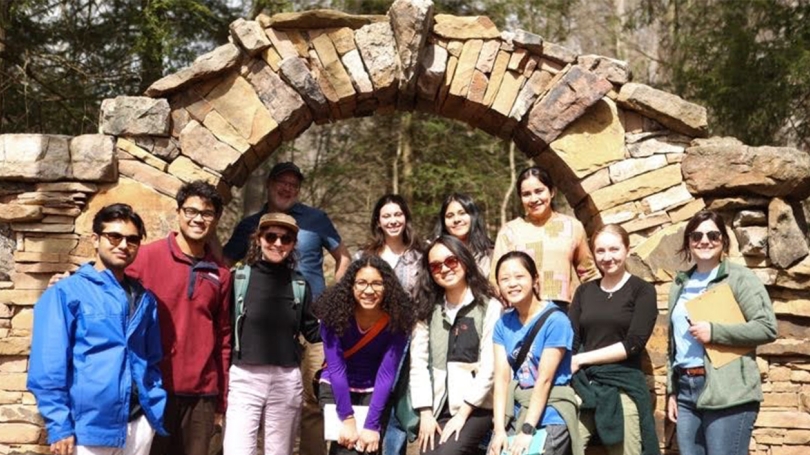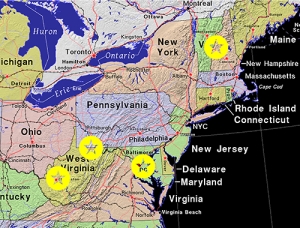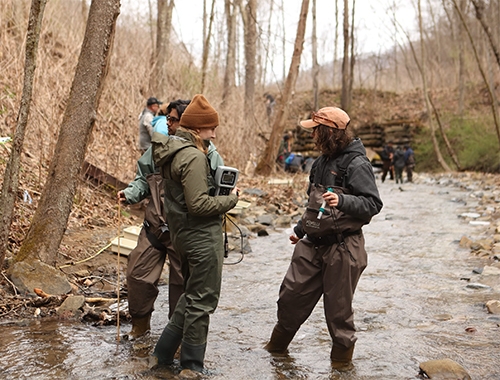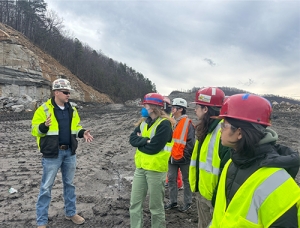

During the spring break of March 18-25, 2025, a diverse group of students embarked on the Appalachia Energy Immersion trip, an educational initiative aimed at helping students understand the complexities of the nation's energy system and its transition. Their adventure took them through West Virginia and concluded in Washington D.C., offering a unique opportunity to engage with stakeholders from grassroots advocates to policymakers. Prior to departure, students dedicated weekly sessions throughout the winter term to learn the contours of the region's unique energy landscape, setting the stage for their exploration.

The coal industry, historically pivotal to America's energy system, remains influential today. Students immersed themselves in the historical and contemporary significance of coal extraction in West Virginia, examining its impact on the people, landscape, environment, and economy. Through this exploration, they heard lived experiences directly from community members and participated in hands-on activities like macroinvertebrate sampling in streams impacted by acid mine drainage. Their work on the ground reinforced the intrinsic link between environmental health and human well-being, and their practical experiences illuminated the interconnectedness of energy systems, ecological health, and community vitality.
Leo Espinoza Campomanes '27 observed, "For many in West Virginia, coal isn't just an industry, it's a lifeline. Despite the health consequences like black lung, they viewed coal as a source of pride and economic stability."
Students grappled with essential questions including: How can regions adapt when critical industries fade? What is Appalachia's energy future, and how can a just transition be achieved without repeating historical mistakes? What roles can consumers play in these systems? These guiding questions steered their journey and reflections throughout the trip.

As they traveled, intimate conversations unfolded with coal miners, natural gas employees, environmental nonprofits, and clean energy advocates. Students recognized a consistent theme: economic viability is crucial for sustaining energy transitions.
"One recurrent theme, regardless of stakeholder position, that I also noticed was the necessity of embedding economic viability into any clean energy narrative," said Tamhid Islam '26. "Whether it was a coal miner reflecting on the range of available jobs or a federal regulator discussing grid modernization, the subtext was the same: without economic buy-in, no energy transition will last."

While students found an underlying consensus about the economic realities, they also heard varied stakeholder sentiments. June Kim '26 noted, "Talking to people across the energy spectrum helped me realize that energy priorities meant many things to different people: clean air and water, ecological protection, living wages, consistent employment, affordable and renewable power, economic revitalization, voter participation, community resilience, health equity, food access, and inevitably, politics. These priorities were in conflict with one another as often as they coincided."
Throughout their journey, students developed a deep appreciation of the importance of stakeholder conversations in bridging disconnects between policy discussions and on-the-ground realities. Such conversations demonstrated "…how structural barriers and inadequate infrastructure continue to prevent well-intentioned policy goals from translating effectively into tangible local benefits," explained Sourjya Barman '26. He went on to add, "The lesson I'll carry? Listen to the stories, not just the statistics. Policy without proximity is performative."
The Appalachia Energy Immersion trip was a transformative journey for each student. Through this immersive experience, students not only learned about energy systems but also about their own roles in fostering a sustainable and equitable energy future.
"For someone who is passionate about continuing down the energy path, I am so grateful to have had the opportunity to go on this journey. I truly felt like I learned a lot about myself and my positionality on energy systems. I always thought of the energy transition as something that would be a linear process… That very first visit to the lab opened my eyes to the fact that an energy transition would not be a linear process at all." – Karla Lopez '27.
As they left the Appalachia Energy Immersion trip, participants were armed with new perspectives on what a just energy transition means, and with the recognition that achieving energy equity requires both systemic inquiry and personal dedication. The reflections of these students, shaped by the diverse voices heard and the complex issues faced during their journey, underscore a universal truth: energy transitions are intricate, multifaceted, and inherently non-linear.
The Appalachia Energy Immersion Trip is sponsored by Dartmouth Sustainability and the Arthur L. Irving Institute for Energy and Society.